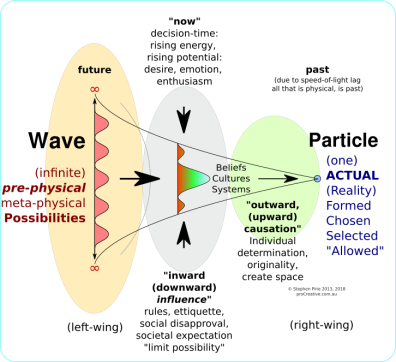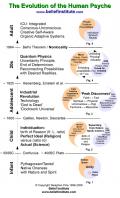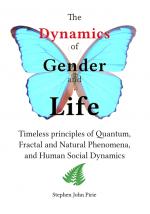Last night while enjoying a wonderful dinner I had the pleasure of engaging conversation with a number of intelligent men on matters philosophical.
It became evident that some held beliefs that were rooted in the ideal of perfection: the age-old belief that when we get 'over there' or perhaps 'up there' everything will be 'perfect' (at which time, we'll have 'transcended' the troubling, fault-ridden ego).
There's only one problem with that idea: how are we ever going to get from being imperfect to perfect; how do we switch from a state of imperfection, into that which disallows anything that is not perfect, but still enter that realm?
I forget if I've written of this before, but there's some simple questions we can ask to see the fallacy of the ideal of perfection:
- If 'up there' (the state of perfection, God, enlightenment) is entirely beyond or disconnected from the 'right now' and 'right here' that includes our ego, what is the connective tissue that joins the two states, and if there is no connective-tissue, how then do we ever 'jump' the gulf?
-
Assume that it is our ego (flawed, ignorant, unenlightened) that is presently the process or aspect of ourselves that is choosing, selecting or judging our circumstances.
 Assume that at some point we become enlightened. What process then enables our (future) enlightened selves (accepting the possibility of non-physical states of being), the experience of choice? If we don't believe we need choice, but still retain some form of awareness, then that would require infinite knowledge of all, in absolute detail, across all times, since we are no longer choosing or blissfully enjoying the many, rich and varied possibilities for enlightened experiences. (See Figure, RPA, left 1).
Assume that at some point we become enlightened. What process then enables our (future) enlightened selves (accepting the possibility of non-physical states of being), the experience of choice? If we don't believe we need choice, but still retain some form of awareness, then that would require infinite knowledge of all, in absolute detail, across all times, since we are no longer choosing or blissfully enjoying the many, rich and varied possibilities for enlightened experiences. (See Figure, RPA, left 1).
-
If in this enlightened state there is no choice (and thus no need of the process as illustrated in Fig. BI_RPA), wouldn't that require the complete absence of surprise, creativity and original experience? How can that not be boring? Would that no
 t constitute the extreme case of a genuine hell? In other words, when extrapolated, is not the standard perception of 'Heaven' in actually an insufferable hell?
t constitute the extreme case of a genuine hell? In other words, when extrapolated, is not the standard perception of 'Heaven' in actually an insufferable hell?
- How can the infinite inclusiveness of the whole of all ('oneness'), not include the validity, usefulness and necessity of the part (ego)? Does not denying the ego, or seeking to 'transcend the ego' require denial of the whole, for in seeking to deny the whole-as-the-part, how can that denial not in effect deny all?
During the discussion, the "fall of mankind" was mentioned. As explained in more detail, the "fall" that religions speak of is simply the healthy individuation and development of any child - 'culture' that needs to cut the umbilical cord that ties it to mother - nature. It's natural and normal to grow, evolve and affirm individuality, a sense of self. Ask any normal child.
Where we are going wrong is to remain stuck in adolescence with our preoccupation with toys, machines, and reasoned-sciences -- our present racial/cultural level of development.
There is one hundred percent diversity and one hundred percent unity, both performing their work at the same time. That is the nature of the work of creation—this is true reality. To us, one seems real and the other unreal. The reality is that both are real at the same time.
Maharishi Mahesh Yogi
- 1. Realising possible into actual, would perhaps better be "Realising Potential into Actual" -- both apply, each with merit
